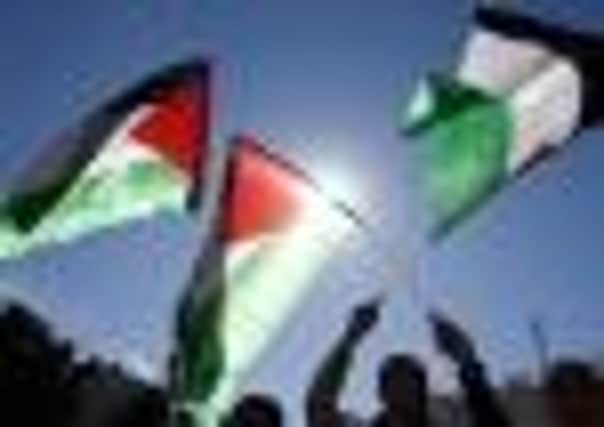UN endorses Palestinian aspirations for statehood


But in Jerusalem, Israeli prime minister Benjamin Netanyahu said the UN resolution, which Mr Abbas pursued despite considerable pressure from the Obama administration, ignores his country’s vital interests and marks a setback to hopes of a negotiated peace.
“Today the international community is giving a birth certificate to the state of Palestine in the land of Palestine,” Palestine Liberation Organisation executive committee member Ahmad Majdalawi told a crowd gathered in Manger Square, site of the Church of the Nativity. “They tried to erase us from the map, but today Palestine returns to the political map. This is a basic step towards the establishment of our state.”
Advertisement
Hide AdAdvertisement
Hide AdAt the UN, the Palestinians were boosted by a final surge of support by European nations for the resolution changing their status from “entity” to “non-member state”.
The vote gives Palestinians a big symbolic boost, underscoring international backing for their cause and isolating Israel and the United States. In practical terms, however, it does not diminish overall Israeli control even over areas nominally under Palestinian self-rule, remove army restrictions on Palestinian movement, or halt Israel’s colonisation of the West Bank, which it captured in the 1967 Middle East war.
But it does give the Palestinians access to international organisations, such as the International Criminal Court where they could file indictments over alleged Israeli war crimes.
Mr Netanyahu said yesterday that the resolution was lacking stipulations that Israeli security must be protected and that the Palestinians must recognise Israel as a Jewish state and be prepared to end the conflict “once and for all”.
“The only way to achieve peace is through agreements reached by the parties directly through valid negotiations between themselves and not through UN resolutions that completely ignore Israel’s vital security and national interests,” he said. “Because the resolution is so one-sided, it does not advance peace, it pushes it backwards.”
In a nod to Jewish settlers in the biblically resonant West Bank who now find themselves in the view of the international community to be illegal residents of an occupied state, he added: “No decision by the UN can break the 4,000-year-old bond between the people of Israel and the Land of Israel.”
The vote last night took place on the 65th anniversary of the UN General Assembly’s endorsement of the partition of British administered Palestine into a Jewish and an Arab state, a day widely celebrated by Israelis as the beginning of the restoration of their homeland after 2,000 years of exile. Back then, Zionist leader David Ben-Gurion accepted the partition even though it fell short of his territorial ambitions for the Jewish state, while Arab leaders rejected the division. Today, it is Mr Netanyahu who refuses to accept a partition that in principle leaves all of the West Bank in Palestinian hands.
Palestinian leaders say they hope their UN gain can be followed by the revival of moribund peace talks with Israel.